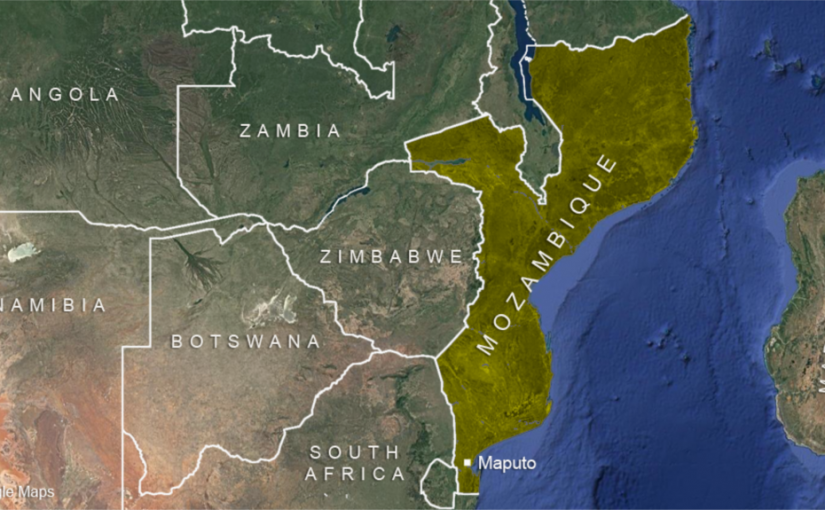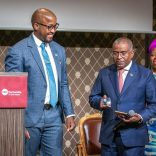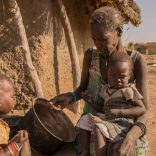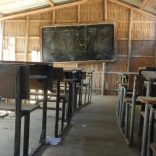Thousands fleeing Mozambique violence: UN
3mn pushed into poverty in 2020 says World Bank – By Joseph Hanlon

FILE - For illustration purposes only. [File photo: VOA Portugues]
In this issue
- 3mn thrown into poverty in 2020
- Could halving poverty be a national mission?
- World Bank wants more service jobs
- Little lending to business
- Ngoenha: no dialogue = instability
Mozambique’s poverty rate is increasing and is “one of the highest in the world” says the World Bank in its Mozambique Country Partnership Framework (CPF, 23 Feb). There was a “marked increase in the national poverty rate” from 48% in 2015 to 63% in 2020. The World Bank estimates that “over 3 million people slipped into extreme poverty in 2020”, meaning “18.9 million people living in poverty according to national standards in 2020.”
Poverty data is slow to be released and the World Bank was comparing the Household Budget Surveys (IOF, Inquerito sobre Orcamento Familiar) of 2014/15 and 2019/20. The national poverty rate is based on MT40 per person per day. The international poverty line is $2.15 per person per day at purchasing power parity (ppp), and shows an increase from 64% in 2015 to 74% in 2020.
Multi-dimensional poverty, including depravations and lack of access to water and other services, had been falling, but increased from 71% in 2015 to 78% in 2020. “In rural areas, conditions reverted to nearly 2002/03 levels, with over 95% of households falling into multidimensional poverty.” Urban multi-dimensional poverty increased from 32% in 2015 to 46% in 2020.
Most people living below the national poverty line (MT40 per person per day) are in the north. The poorest provinces are Nampula (81% below the national poverty line), Cabo Delgado (77%). and Zambezia (75%), Cabo Delgado has become much poorer, with the second largest share of poor in the total population, compared to third in 2015.
“Mozambique’s institutions still need to improve effectiveness, pro-poor orientation, and public trust,” the CPF notes, pointing to “weakness of institutions that are not inclusive and that struggle to mediate and manage relations between the state and its citizens. They are also expressed in both the perception and the reality of deep-seated inequalities between regions and groups, with a sense among some groups of exclusion from power, resources, services, and opportunities.” But government refused to accept this view on Cabo Delgado, and the Bank and EU failed to win local involvement in its programme for Cabo Delgado. CPF admits that the Bank supports the PREDIN programme which “ensures that the Government is guiding the overall response to the conflict and that all interventions in the north of Mozambique are coordinated and aligned under its lead.” In other words, controlled from Maputo.
- Personal view: Could halving poverty be an overriding national mission?
“Mozambique needs to forge a new development paradigm based on diversified sources of growth, productivity, and jobs,” to reverse the present economy of high growth but also sharply increasing poverty and inequality, said the World Bank in its Country Economic Update (CEM, 9 March). But two weeks before, on 23 February, it published the Country Partnership Framework (CPF), which underlined the old development paradigm in force for 30 years – natural resources and the private sector to reduce poverty. And CEM sang the old song of privatisation of state owned enterprises and land. This three decades old paradigm is the cause of the poverty and inequality.
These reports are published just as the US and EU have jettisoned this 30 year old paradigm and replaced it with their programmes for a green economic transformation. In the industrialised north, there is a radical change in how we think about economic development. China did this a more than decade ago. But this thinking has not trickled down to Africa.
The first step is to abandon dichotomies – public vs private, top down vs bottom up, etc – explained Prof Mariana Mazzucato in a talk at London School of Economics 13 March. Some of her research was on the first moon mission. On 25 May 1961 US President John F. Kennedy set the objective of a crewed lunar landing and return to earth, which happened only eight years later, in July 1969. Prof Mazzucato stressed that this succeeded because the national government set a clear national mission objective, created money and provided huge support, and rewrote the rules on how government, private sector, and universities and research institutions worked together. Government shaped the market and defined the desired outcomes, but getting there was a collective process.
This also happened with the “New Deal” in the US in the 1930s, in the great depression, with an objective of creating jobs and reducing poverty. It was a collective process of government, the private sector, creative and dynamic people, and communities. And what President Joe Biden is doing now in the US is sometimes called the “Green New Deal”, breaking the paradigm of the last three decades to bring together national government with goals and money, the private sector, and local communities. It is about stressing the “common good”, bringing everyone in – private and public, big government and communities. Not “or”, but “both”. The World Bank, IMF and many donors continue to ignore the fast changing thinking in their own capitals.
The Financial Times (FT 23 March) points out that China is the undisputed world leader in solar- power technology. Since 2011, the country has invested over $50bn in new solar panel manufacturing capacity, 10 times more than Europe – which in its rush to go green is installing Chinese solar panels. In China government, private sector and universities worked collectively to advance the production of materials, notably polysilicon, the main raw material for solar panels, and technologies used in the production of the wafers that form the basis of solar cells. The FT quotes Raphaël Glucksmann, a European parliament member who serves on the international trade committee: “Thirty years of deregulation and free-trade policy in Europe has ironically led to the triumphs of the Chinese Communist party.”
Perhaps most important in the mission approach is sharing risk and making changes – experimenting to see what works, and recognising that the process of trial-and-improvement involves many wrong turns. Indeed, trying something new and the experiment not working out must be praised, not criticised. And it involves openness and collaboration; the fiasco of the new TSU salary scale show why big projects cannot be done in secret in Mozambique.
What would happen if Mozambique adopted a mission objective? Might the next President announce a mission of halve poverty in 5 years, and that this would be the single most important objective of their presidential term, that rules would be rewritten to make it happen, and that it would be done with public and community involvement at all levels. The World Bank says that in 2020 there were 19 million people living in poverty according to national standards, so the mission target would be fewer than 9 million in poverty in five years.
Just as the New Deal and moon mission transformed how people thought and worked, to succeed this mission would have to change how party and state work. Officials and others would face challenges – asking how does what you are doing contribute to the goal of halving poverty? The need for haste would force the involvement of municipalities working locally, drawing on the wealth of local knowledge and the understanding that Mozambique is a big country with very different local conditions.
The goal of the past 30 years has been private profit. If the national goal were halving poverty, different decisions would be made.
Of course the IMF, some donors, and some in the cities who have gained would object. But if there was consensus on the mission goal and public debate about the process, objections could not sustained.
The US and EU are showing how rapidly thinking and paradigms are changing. Will Mozambique be left behind yet again, obediently following the IMF? Or will the next President be brave enough to declare a mission to halve the number of poor Mozambicans? jh
- World Bank advises service jobs and a freer market
“Services can drive growth and job creation” argues the World Bank in its latest Mozambique Economic Update (MEU, 10 March) “Mozambique’s commercial services exports are dominated by traditional services (travel and transport). Services need to upgrade into more sophisticated and tradable activities – such as ICT, finance, and professional and business services – to become an engine of inclusive growth and employment creation.”
The Bank also repeats calls for more neo-liberal “reforms”. Mozambique should end the requirement that service providers must be established locally and relax restrictions on employing foreign workers. It also wants to make it easier to transfer land, in a step toward land privatisation.
- OMR says World Bank condemns Mozambique to underdevelopment
The World Bank Mozambique Economic Update (MEU, 10 March) “is consistent in its attempt to impose economic policies which deepen the underdevelopment of poor countries, integrating them dependently into the world system of domination by the interests of countries and multinationals within a geostrategic, political, military and economic framework,” responds Joao Mosca of the rural workshop (OMR, 20 March)
The World Bank refers to services as the engine for structural transformation, without considering that these changes are long term, dependent on geostrategies of international capital, political forces that combine political and economic elites, external and local,” he writes. “To prioritise services is to condemn an economy to the condition of underdeveloped, with unfavourable terms of trade in the international market and to transform these economies into producers of natural resources and commodities, without industrialisation, a tapered service sector and servant of the exporting sectors, deepening social inequalities, food dependency and with low results in poverty reduction.”
- High interest rates and huge government borrowing means little lending to domestic business
Mozambique has “one of the highest real interest rates in Sub-Saharan Africa” – 13% when risk and inflation is taken into account – according to the World Bank MEU.
“The tight monetary stance has constrained access to credit – one of the most significant challenges for firms in Mozambique. Credit to the private sector (at 22% of GDP) is below the sub-Saharan average of 38% of GDP. Only 10% of domestic firms have a bank loan, compared to 20% in Sub-Saharan Africa (SSA). Despite being relatively low, the proportion of commercial bank credit to the private sector has fallen in recent years, coinciding with a steep increase in lending to the government,” reports the MEU.”
“Commercial banks maintain high profits and have reported solid system-wide capital and liquidity ratios. As of the third quarter of 2022, the system-wide capital adequacy ratio (CAR) was 23.5%, well above the regulatory minimum of 12%.” Banks prefer lending to the state, crowding out the private sector. By November 2022, net lending by the financial sector to the government and the economy stood at MT159bn ($2.5bn, 13.8% of GDP),
“The wage bill and debt service absorbed over 90% of all tax revenues” notes the MEU.
- Lack of dialogue between government and society is a great danger to stability – Severino Ngoenha
Lack of dialogue between government and society is a great danger to stability, and “it is time to encourage openness to dialogue, respect for the voices of all Mozambicans and the search for collaborative solutions to the problems that plague us,” argued Severino Ngoenha in an Easter article. He is a philosopher and Rector of the Technical University of Mozambique (UDM).
“Hunger and misery affect many Mozambicans”, so “it is time to reflect on the importance of finding solutions to ensure that all people have access to adequate and sufficient food”.
“Wars and terrorist threats bring suffering and instability to many communities; it is time to seek ways to promote peace, dialogue and mutual understanding as a way to resolve conflicts and build a more secure and harmonious future,” he adds. “It is time to encourage openness to dialogue, respect for the voices of all Mozambicans and the search for collaborative solutions to the problems that plague us.”
“At this crucial moment, it is fundamental to avoid violence as a way to solve problems. History shows us that violence only brings more pain and suffering. We must seek alternative paths, based on understanding, dialogue and the search for peaceful and just solutions,” Ngoenha concludes. (Carta De Moçambique 10 Apr)
By Joseph Hanlon












Leave a Reply
Be the First to Comment!
You must be logged in to post a comment.
You must be logged in to post a comment.